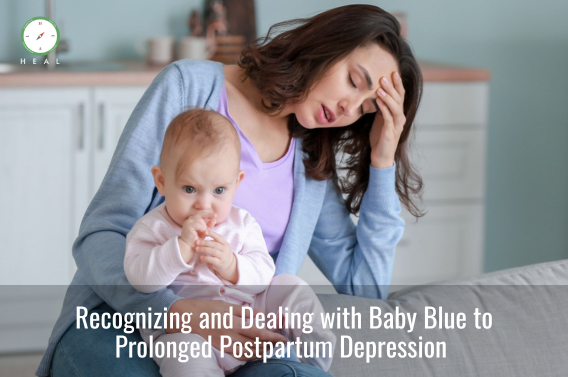Welcoming a new baby into the world is often considered a joyous occasion, but for many new mothers, the period after childbirth can be accompanied by a range of intense emotions that go beyond the expected baby blues after delivery While it's normal for new mothers to experience mood swings, irritability, and feelings of sadness during the first few weeks postpartum, these symptoms usually subside on their own. However, when these feelings persist and intensify, it might be a sign of a more serious condition known as prolonged postpartum depression.

Prolonged postpartum depression, also referred to as persistent postpartum depression or postpartum major depressive disorder, is a mental health condition that affects some women after giving birth. Unlike the temporary "baby blues," which typically last for a couple of weeks, prolonged postpartum depression can continue for months or even longer.
Intense and unrelenting feelings of sadness, hopelessness, and emptiness
Loss of interest or pleasure in once enjoyable activities
Fatigue and lack of energy, often unrelated to lack of sleep
Changes in appetite and weight
Sleep disturbances, such as insomnia or excessive sleeping
Difficulty bonding with the baby
Trouble concentrating or making decisions
Persistent feelings of guilt, worthlessness, or inadequacy
Thoughts of death or suicide.
Mental health professionals play a pivotal role in identifying, addressing, and supporting individuals experiencing baby blues after delivery or postpartum depression. Their expertise and guidance contribute to the well-being of both the individual and their family during a challenging period. They are crucial for several important reasons:
Accurate Diagnosis: Mental health professionals are the experts in accurately diagnosing postpartum depression. Proper diagnosis ensures that the right treatment plan is implemented, addressing the specific needs of the individual.

Differentiation from "Baby Blues": Mental health professionals can distinguish between the common baby blues after delivery and postpartum depression. This differentiation is essential, as it determines the appropriate level of care and support needed.
Tailored Treatment: PPD can manifest differently for each individual. Mental health professionals can develop personalized treatment plans, which may include therapy, medication, or a combination of both, based on the severity of symptoms and the patient's unique situation.
Providing Emotional Support: Mental health professionals offer a safe and non-judgmental space for individuals to discuss their feelings and emotions. This emotional support is crucial for those struggling with the challenges of PPD.
Coping Strategies: Professionals can provide coping strategies and techniques to manage the symptoms of PPD. These strategies empower individuals to navigate their emotions and daily life more effectively.
Creating a Supportive Environment: Mental health professionals play a vital role in creating a supportive environment for new parents. Their guidance can help family members and partners better understand PPD, leading to improved relationships and support structures.
Monitoring Progress: Regular sessions with mental health professionals allow for the monitoring of progress. Adjustments can be made to the treatment plan as needed, ensuring that the individual is on the path to recovery.

Addressing Underlying Issues: PPD can sometimes be triggered or exacerbated by preexisting mental health conditions. Mental health professionals can identify and address these underlying issues, leading to more effective treatment.
Education and Guidance: Professionals provide education about PPD, its causes, symptoms, and available treatment options. This knowledge empowers individuals to make informed decisions about their mental health.
Preventing Long-Term Consequences: If left untreated, PPD can have long-term effects on both the individual and their family. Mental health professionals help prevent these consequences by providing timely intervention.
Safe Space for Expression: Mental health professionals offer a confidential and judgment-free space for individuals to express their fears, anxieties, and concerns. This therapeutic relationship can significantly contribute to the healing process.
Validation of Feelings: Experiencing PPD can be isolating, and individuals may feel guilt or shame. Mental health professionals validate these feelings, helping individuals understand that what they're going through is real and valid.

Recognizing the significance of destigmatizing postpartum mental health, open conversations initiated by mental health professionals are invaluable. By openly discussing the challenges, emotions, and experiences that come with the postpartum period, they pave the way for a more supportive and understanding environment. Patient's willingness to share their insights not only breaks down the isolation that often accompanies such struggles but also encourages others to seek help without fear or shame. Their advocacy fosters empathy and education, contributing to the overall well-being of parents and highlighting the importance of addressing postpartum mental health as an integral component of holistic care.
Vidhi Beri is a renowned Global Educator and Specialist in the field of Holistic Health. As a health transformation coach, she involves guiding and supporting individuals in making positive changes to improve their overall health and well-being. She aims to help clients achieve their health goals and create sustainable lifestyle changes. To know her work better, please visit the official website https://www.vidhiberi.com/